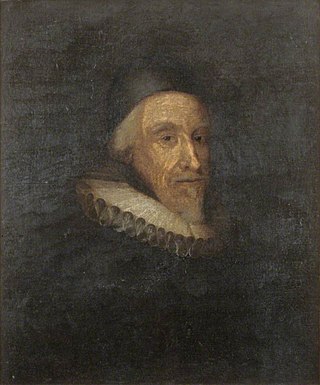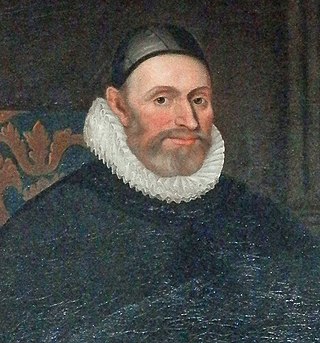Related Research Articles

Alexander Henderson was a Scottish theologian, and an important ecclesiastical statesman of his period. He is considered the second founder of the Reformed Church in Scotland. He was one of the most eminent ministers of the Church of Scotland in the most important period of her history, namely, previous to the middle of the seventeenth century.

Marischal College is a large granite building on Broad Street in the centre of Aberdeen in north-east Scotland, and since 2011 has been the headquarters of Aberdeen City Council. The building was constructed for and is on long-term lease from the University of Aberdeen, which still uses parts of the building to store its museum collections. Today, it provides corporate office space and public access to council services, adjacent to the Town House, the city's historic seat of local government. It is the second largest granite building in the world.

Andrew Cant (1584–1663) was a Presbyterian minister and leader of the Scottish Covenanters. About 1623 the people of Edinburgh called him to be their minister, but he was rejected by James I. Ten years later he was minister of Pitsligo in Aberdeenshire, a charge which he left in 1638 for that of Newbattle in Midlothian. In July of that year he went with other commissioners to Aberdeen in the vain attempt to induce the university and the presbytery of that city to subscribe the National Covenant, and in the following November sat in the general assembly at Glasgow which abolished episcopacy in Scotland. In 1638 Cant was minister of Pitsligo in Aberdeenshire. In 1640 he was chaplain to the Scottish army and then settled as minister in Aberdeen. Though a staunch Covenanter, he was a zealous Royalist, preaching before Charles I in Edinburgh, and stoutly advocating the restoration of the monarchy in the time of the Commonwealth. Cant's frequent and bitter verbal attacks on various members of his congregation led in 1661 to complaints laid before the magistrates, in consequence of which he resigned his charge.
George Gledstanes was an Archbishop of St Andrews during the seventeenth century.

Patrick Forbes was a late 16th-century and early 17th-century Scottish churchman rising to the post of Protestant Bishop of Aberdeen.
Robert Baron (1596–1639) was a Scottish Presbyterian minister, theologian and one of the so-called Aberdeen doctors. He is commemorated in the Calendar of saints of the Scottish Episcopal Church on 28 March.

Sir Thomas Burnett, 1st Baronet of Leys was a feudal baron and leading Covenanter who had represented Kincardineshire in the Scottish Parliament in 1621.
John Forbes (c.1568–1634) was a Scottish minister exiled by James VI and I. He founded a Church of Scotland in Middelburg in the Netherlands. He was born about 1568, and was third son of William Forbes of Corse and Elizabeth, daughter of Alexander Strachan of Thornton. He graduated M.A. at St Andrews in 1583, and was settled in Alford in 1593. In November 1602 the General Assembly chose him as one of those whom the King might select for nominating commissioners from the various Presbyteries to Parliament. At Alford he came into conflict with the powerful sept of the Gordons, who were vigorous opponents of Protestantism, and when the Synods of Aberdeen and Moray excommunicated the Marquess of Huntly, and Huntly had appealed successfully to the Privy Council, Forbes was sent by these Synods to London to represent the case to King James. He was elected Moderator of the General Assembly of Aberdeen on 2 July 1605 contrary to the King's order. Of twelve Aberdeenshire ministers who were present ten afterwards admitted the illegal nature of the Assembly, but Forbes [and Charles Fearn, minister of Fraserburgh] having been summoned before the Privy Council, declined the Council's jurisdiction, on the ground that the Assembly had dealt wholly with spiritual matters. For this he was imprisoned at Blackness, tried for high treason, and banished the country. On 7 November 1606 he sailed from Leith for Bordeaux, and after spending a time with Boyd of Trochrig at Saumur, he proceeded to Sedan. Much of his work thereafter consisted in visiting the Reformed Churches and Universities on the Continent, in which were many Scots students and professors. In 1611 he became minister of the English congregation at Middelburg, Holland, and soon after he was offered release from his sentence, but upon conditions he could not accept. In 1616 he came to London, where he had an interview with the King, who promised to annul his banishment — a promise which was not fulfilled. In 1621 he was minister at Delft, but the hatred of his former ministerial brethren, some of whom were now bishops, instigated Laud and the English Government to procure his dismissal, and this was carried out in 1628. He died in Holland in 1634.
John Forbes of Corse was a Scottish Presbyterian minister and theologian, one of the Aberdeen doctors, noted for his eirenic approach in church polity and opposition to the National Covenant.

David Dickson (1583–1663) was a Church of Scotland minister and theologian.

William Guild (1586–1657) was a Scottish Presbyterian minister, academic and theological writer.
Patrick Forbes (c.1610–1679) was a Scottish Protestant Bishop of Caithness.

James Fraser of Brea (1639–1699) was a Covenanter.
Andrew Ramsay (1574–1659) was a minister of the Church of Scotland, academic at the University of Edinburgh, and writer of Latin poetry.
James Sibbald was a Scottish Royalist Presbyterian minister and theologian.
Andrew Duncan was a Latin scholar and Church of Scotland minister at Crail. He achieved notoriety for his presbyterian principles which brought him into conflict with James VI who wished to impose an episcopalian system. He attended the General Assembly of Aberdeen in 1605 which had been proscribed or prorogued by royal authority and was one of six ministers who were imprisoned and later exiled as a result. He was allowed to return after several years in France but was subsequently banished again following further controversy in failing to comply with the Five Articles of Perth. He died in exile in Berwick-upon-Tweed in 1626.
David Leitch was a Scottish philosopher who was commissioned to create various paraphrases and served as chaplain to the army during the English Civil War and as chaplain to King Charles II.
Alexander Scrogie (1565–1659) was a Scottish clergyman in the Church of Scotland who was minister of St Machar's Cathedral in Aberdeen and was an anti-Covenanting figure in Scotland during the English Civil War. He served as Rector of Aberdeen University.
Robert Barron (1596–1639) was a Scottish academic who was elected Bishop of Orkney in the Church of Scotland but died before his consecration. He was the first Professor of Divinity at Marischal College.
References
Citations
Sources
Primary
- The Answers of Some Brethren of the Ministerie to the Replies of the Ministers and Professours of Divinitie in Aberdene, Concerning the Late Covenant. Also, Duplies of the Ministers and Professors of Aberdene, to the second Answers of some reverend Brethren, Concerning the Late Covenant, R. Young: Edinburgh, 1638.
Secondary
- Denlinger, Aaron Clay (2012). ""Men of Gallio's Naughty Faith?": The Aberdeen Doctors on Reformed and Lutheran Concord". Church History and Religious Culture. 92 (1): 57–83. doi:10.1163/187124112X621275. ISSN 1871-241X.
- Kerr, John (2014). Scottish Education. Cambridge University Press. pp. 132–3. ISBN 9781107455917.
- Macmillan, Donald (1909). The Aberdeen doctors : a notable group of Scottish theologians of the first episcopal period, 1610–1638 and the bearing of their teaching on some questions of the present time. London: Hodder and Stoughton.
